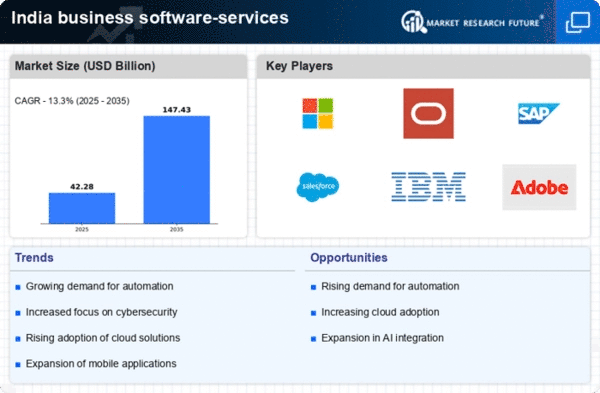Digital Transformation Initiatives
The ongoing digital transformation initiatives across various sectors in India are propelling the business software-services market. Organizations are increasingly adopting software solutions to enhance operational efficiency and customer engagement. According to recent data, the Indian software market is projected to grow at a CAGR of 10.5% from 2023 to 2028. This growth is driven by the need for businesses to modernize their processes and leverage technology for competitive advantage. As companies invest in digital tools, the demand for software services that facilitate this transformation is likely to rise, indicating a robust future for the business software-services market.
Government Initiatives and Support
Government initiatives aimed at promoting technology adoption are significantly influencing the business software-services market in India. Programs such as Digital India and Make in India are encouraging businesses to integrate advanced software solutions into their operations. These initiatives not only provide financial incentives but also foster an ecosystem conducive to innovation. As a result, the business software-services market will benefit from increased investments and partnerships between the public and private sectors. The government's focus on enhancing digital infrastructure further supports the growth trajectory of the market, potentially leading to a more competitive landscape.
Increased Focus on Customer Experience
The growing emphasis on customer experience is reshaping the business software-services market in India. Companies are recognizing the importance of delivering personalized and efficient services to retain customers. This shift is driving the demand for software solutions that enable data analytics, customer relationship management, and feedback mechanisms. As businesses strive to enhance customer satisfaction, the market for software services that facilitate these objectives is expected to expand. Recent studies indicate that organizations investing in customer experience software can see a return on investment of up to 300%, underscoring the potential for growth in the business software-services market.
Rising Demand for Remote Work Solutions
The shift towards remote work has created a substantial demand for software solutions that support collaboration and productivity. In India, businesses are increasingly seeking tools that enable seamless communication and project management among distributed teams. This trend is reflected in the growth of the business software-services market, which is expected to reach $10 billion by 2026. Companies are prioritizing investments in software that enhances remote work capabilities, thereby driving innovation and service offerings in the market. The emphasis on flexibility and adaptability in work environments suggests that the business software-services market will continue to thrive.
Emergence of Startups and Innovation Hubs
The emergence of startups and innovation hubs in India is significantly impacting the business software-services market. With a vibrant ecosystem fostering entrepreneurship, many startups are developing niche software solutions tailored to specific industry needs. This trend is contributing to a dynamic market landscape, where traditional players are compelled to innovate and adapt. The business software-services market is projected to benefit from this influx of creativity and technological advancements. As startups continue to attract investment and attention, the overall market is likely to experience accelerated growth, driven by fresh ideas and competitive offerings.
















